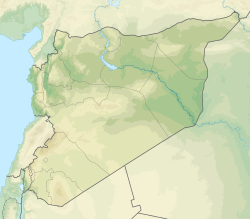Tell Kashkashok
Appearance
(Redirected from Tell Kashkashuk)
أخبر كاشكاشوك | |
| Alternative name | Tell Kashkashuk |
|---|---|
| Location | Al-Hasakah Governorate, Syria |
| Region | Upper Mesopotamia |
| Coordinates | 36°38′20″N 40°38′21″E / 36.63880°N 40.63903°E |
| Type | archaeological site, cluster |
| Length | 250 metre (Kashkashok III) |
| Width | 220 metre (Kashkashok III) |
| Diameter | 50 metre (Kashkashok I) |
| Height | 2 metre (Kashkashok I), 20 metre (Kashkashok III) |
| History | |
| Periods | Halaf culture (Kashkashok I) |
| Site notes | |
| Excavation dates | 1986–1991;[1] 1987–1990[2] |
| Archaeologists | Antoine Suleiman (Kashkashok III, Kashkashok I) |
Tell Kashashok (أخبر كاشكاشوك) is an archaeological site in the Khabur River Valley,[3] of Northern Syria.[4] The site is dated by pottery finds to the latter neolithic era,[5] and early Dynastic era.[6] The site was excavated by the Directorate General of Antiquities of Syria in 1987 and 1988.[7][8] The Early Dynastic era includes a destruction layer,[8] and an early adoption of cuneiform. It may have been known in antiquity as Kiš.[8] A few clay numerical tablets from the EB III were found.[9]
References
[edit]- ^
Error: Unable to display the reference from Wikidata properly. Technical details:
- Reason for the failure of {{Cite web}}: The Wikidata reference contains the property DOI (P356), which is not assigned to any parameter of this template.
- Reason for the failure of {{Cite Q}}: The output template call would miss the mandatory parameter
1.
- ^ Yoshihiro Nishiaki (2018). "The Late Halafian Lithic Industry of Tell Kashkashok I,the Upper Khabur, Syria". Orient: Journal of the Society for Near Eastern Studies in Japan. 53: 1–21. Wikidata Q110235842.
- ^ Matsutani, Memoirs of the Institute of Oriental Culture (University of Tokyo 1987) vol 109.
- ^ Buccellati, Giorgio. "The Floodwaters of Urkesh and the Structural Coherence of the Urkesh Temple Complex" (PDF). Urkesh. Retrieved 11 September 2020..
- ^ Nishiaki, Yoshihiro (1992). "Preliminary Results of the Prehistoric Survey in the Khabur Basin, Syria: 1990-91 Seasons". Paléorient. 18 (1 (1992)): 97–102. doi:10.3406/paleo.1992.4566 – via JSTOR.
- ^ Glassner, Jean-Jacques (2003). The Invention of Cuneiform : Writing in Sumer. Baltimore: Johns Hopkins University Press. p. 35. ISBN 9780801873898. OCLC 51041422.
- ^ MATSUTANI, Toshio. "Excavation at Tell Kashkashok II, 1987." Tōyō bunka kenkyūsho kiyō 109 (1989): 1-33
- ^ a b c Frayne, Douglas (2008). Pre-Sargonic Period - 2700-2350 BC. Toronto: University of Toronto Press. ISBN 978-1-4426-9047-9. OCLC 1100706906.
- ^ Philippe Quenet. “The Diffusion of the Cuneiform Writing System in Northern Mesopotamia: The Earliest Archaeological Evidence.” Iraq, vol. 67, no. 2, 2005, pp. 31–40
Further reading
[edit]- "Tell Abu Hğaira (Syrian dig)", Syria 72, 1995, p. 183-190 (= CAAS II); "The Temples of Tell Kashashok and Tell Abu Hujeira", Mr. Al-Maqdissi, M. Abdul Karim, A. Al-Azm & M. Al-Khoury (ed.), The Syrian Jezireh. Cultural Heritage and Interrelations. Proceedings of the International Held Conference at Deir ez-Zor (22-25 April 1996), Damascus, 2002, p. 45-55 (= DAS I), in Arabic.
- Tall Kash-Kashok, H. Weiss, Ed., The Origins of North Mesopotamian Civilization: Ninevite Chronology, Economy, Society (Yale Symposium, 1988), Yale, 1988; AT. Suleyman & A. Taraqji, "Tell Kashkashuk at the time of Halaf", S. Cluzan, E. Delpont & J. Mouliérac (dir.), Syria, memory and civilization, Paris, 1993, p. 48; "Tell Kashkashouk", Syria 72, 1995, p. 170-183 (= CAAS II); "The Temples at Tell Kashashok in the Third Millennium BC", op. cit. not. 3, p. 321–322; "The Temples of Tell Kashashok and Tell Abu Hujeira", ibid., pp. 45–55.


